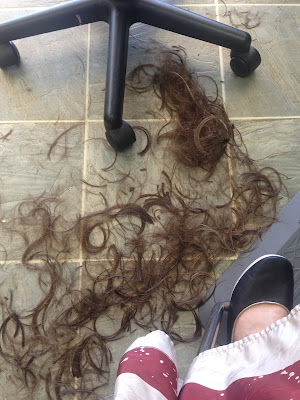My friend texted
me this morning. “The Zumba class taught by my friend is free and
we can go as non-members. Wanna come with me this morning?”
I was on my own
for the day and I've never experienced Zumba, so I jumped at the
opportunity. An hour later, we were headed to class.
I wasn't prepared
for all the mental things I would confront as I worked to keep up. I
kept moving and found myself formulating the key points of this post
to the loud beats of the music.
You can take the
girl out of ballet, but apparently you cannot take the ballet out of
the girl. Zumba arm movements are not ballet, but for the life of me
I couldn't stop making them. Thankfully, I was in the back of the
class and it was so full that much of the time I couldn't see myself
in the mirror. I had flashbacks of my ballet classes when I was
learning a new combination and couldn't quite get it. Today, as I did
back then, I caught myself mentally shutting down. As in meditation,
each time I noticed that inclination, I brought myself back to the
steps and kept moving with less judgment. The class progressed and in
a sign of gentleness to my self, I concentrated on the footwork and
let go of the arms. That helped.
The strongest
impressions I had to work through were my perfectionism—I wanted to
get the steps exactly right every time—and how out of place I felt
as a skinny body in this class. What a strange moment to realize that
the thing that brings many of the women to a class like this—their
curves—are the things I'm lacking. Everyone around me was sweating.
Since fans were blowing, I kept my long sleeve running shirt on the
entire 90 minutes. That reminded me of playing t-ball in the heat of
Kansas summers when I was eight. The team would run laps around the
field to warm up and everyone else would be sweating, but not me. I
thought it was the coolest thing to sweat—it was a sign you'd done
the work.
I estimate that I
spent the first hour of the class over-thinking the steps and the
perfectionism and skinniness. I finally decided that using this
morning as an opportunity to try something new and to feel playful in
my body was a better use of my mental energy. I also celebrated the
friendship I have with the friend boogie-ing next to me. She loves
Zumba and enjoyed every minute of the well-led class. I was grateful
that I was with her—we know each other so well, there was no need
to feel self-conscious next to her. I knew she wasn't judging or
ridiculing me. She was too busy dancing her heart out.
In moments like
this, I can't help but think of my 40/40 list and the space it
created for me to sample new things. I don't see myself seeking out
Zumba regularly, but it was a great class and I am really glad I did
it. I am also really grateful to be faced with the mental habits that
still get me tangled up, and to see that with practice, they don't
have the same vice grip on me as they have in the past. This is
progress.






















